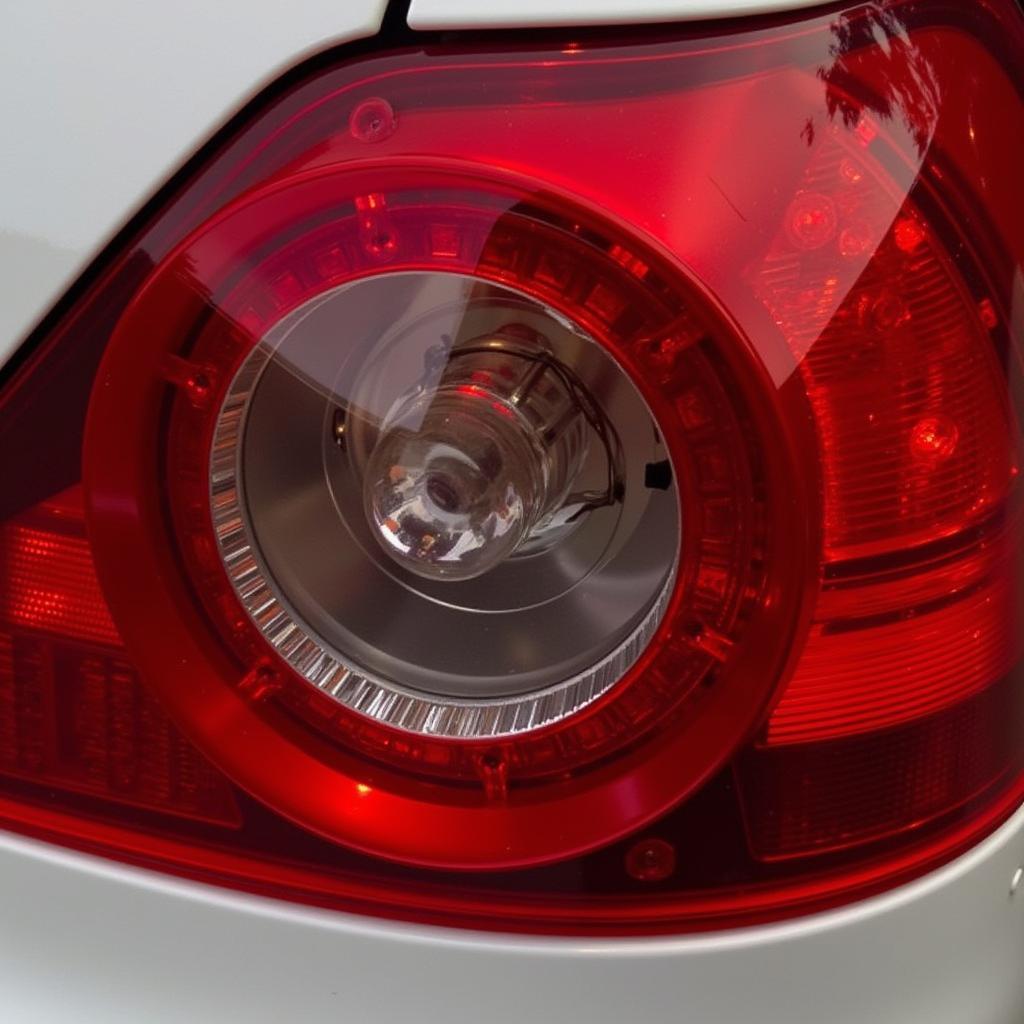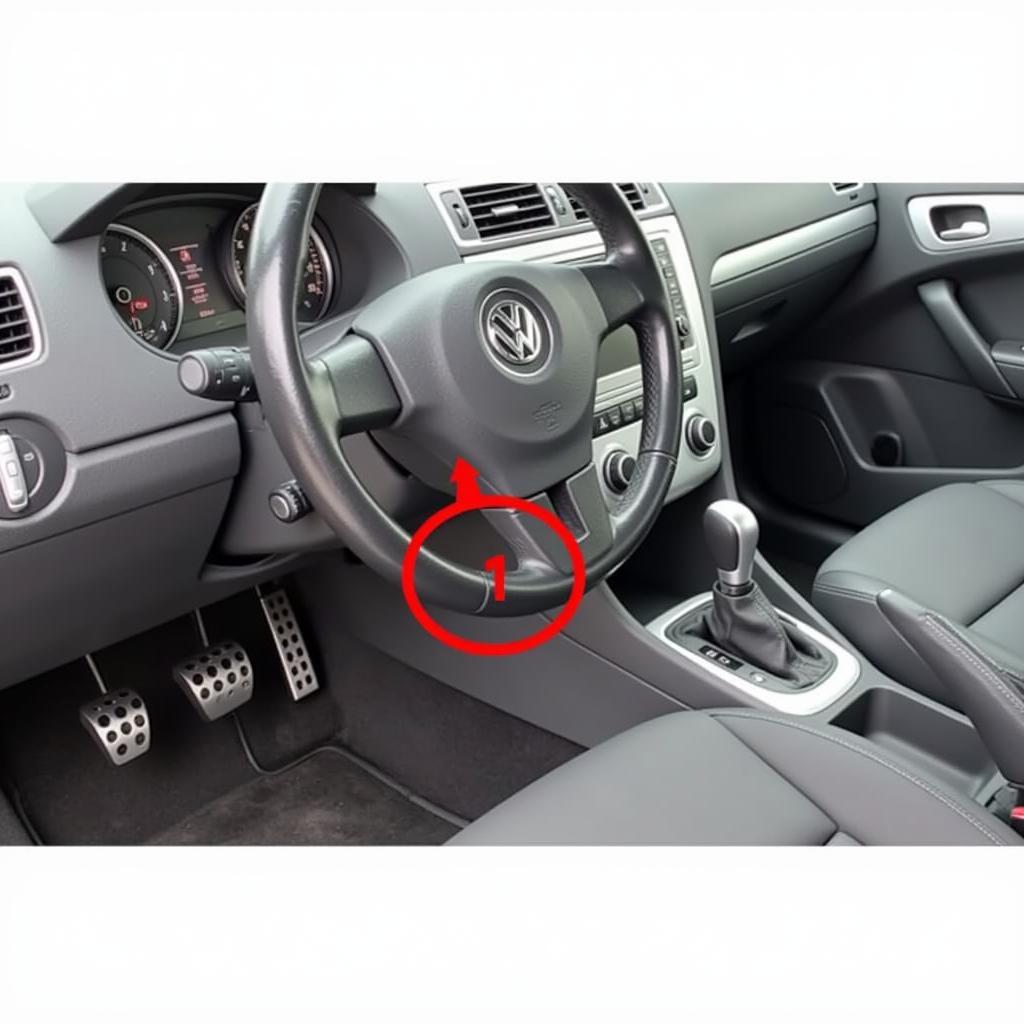A brake light warning on your 2009 Volkswagen Eos dashboard is a clear sign that something isn’t right with your braking system. While it might seem like a minor inconvenience, ignoring this warning could compromise your safety and that of others on the road. This comprehensive guide will delve into the common causes of a 2009 Eos brake light warning and provide you with potential solutions to get you back on the road safely.
Understanding the Warning Signs
The brake light warning on your Eos dashboard can manifest in a few different ways:
- Illuminated Brake Light Symbol: The most obvious indication is a lit-up brake light icon on your dashboard, often accompanied by an exclamation mark.
- Flickering Brake Light: A flickering brake light can also indicate an issue with the brake light system, signaling a potential electrical problem.
- Brake Warning Light with Other Warning Lights: If the brake light warning appears alongside other warning lights, like the ABS or ESP lights, it could indicate a more serious issue with the car’s electronic stability control or braking system.
Common Causes and Solutions
Several culprits can trigger a brake light warning on your 2009 VW Eos. Let’s explore some of the most common causes and their potential fixes:
1. Burnt-Out Brake Light Bulbs
This is the most common and simplest issue to resolve.
- Solution: Inspect all your brake lights, including the high-mounted brake light, for burnt-out bulbs. Replace any burnt-out bulbs with the correct type for your Eos model.
 Burnt Brake Light Bulb
Burnt Brake Light Bulb
2. Faulty Brake Light Switch
Located behind the brake pedal, this switch activates your brake lights when you press the pedal. A malfunctioning switch won’t allow the signal to reach the lights.
- Solution: A faulty brake light switch will need to be replaced. This can often be done at home with basic tools.
 Brake Light Switch Location
Brake Light Switch Location
3. Blown Fuse
A blown fuse in your car’s fuse box could be the reason your brake lights aren’t working.
- Solution: Consult your owner’s manual to locate the correct fuse for the brake lights. Check the fuse for any signs of damage and replace it if necessary.
4. Wiring Problems
Corrosion, loose connections, or damaged wiring in the brake light circuit can disrupt the flow of electricity.
- Solution: Thoroughly inspect the wiring harness connected to the brake light bulbs and the brake light switch. Look for any signs of damage, wear, or loose connections. Repair or replace any damaged wiring and secure loose connections.
5. Faulty Body Control Module (BCM)
While less common, a malfunctioning BCM, responsible for controlling various electrical functions in your car, including lighting, can cause a brake light warning.
-
Solution: Diagnosing and repairing a faulty BCM requires specialized diagnostic tools and expertise. It’s recommended to seek professional assistance from a qualified mechanic or a Volkswagen dealership.
“A faulty brake light switch is one of the most common reasons we see Eos owners for this warning,” says master mechanic John Smith of Smith’s Auto Repair. “Thankfully, it’s a relatively inexpensive part to replace and a repair that many DIYers can tackle themselves.”
6. Aftermarket Accessories
Installing aftermarket accessories that tap into the brake light circuit, such as trailer hitches or custom lighting, can sometimes cause issues.
- Solution: If you’ve recently installed any aftermarket accessories related to the lighting system, consider disconnecting them temporarily to see if the brake light warning disappears.
What to Do When the Brake Light Warning Comes On
-
Don’t Panic: While a brake light warning is a serious matter, it’s important to remain calm.
-
Check Your Surroundings: If possible, pull over to a safe location away from traffic.
-
Inspect Your Lights: Turn on your hazard lights and visually check all your brake lights, including the high-mounted one, for any signs of malfunction.
-
Assess the Situation: If you suspect a simple issue like a burnt-out bulb, and you feel comfortable replacing it yourself, do so. However, if you’re unsure about the cause or uncomfortable tackling repairs, it’s best to seek professional help.
“It’s always better to err on the side of caution when it comes to your car’s safety,” advises automotive safety expert Sarah Jones. “If you’re ever in doubt about the cause of a warning light, it’s always best to have it checked out by a professional.”
Preventing Future Brake Light Warnings
- Regular Maintenance: Schedule routine maintenance checks for your Eos, including inspections of the brake system and electrical components.
- Quality Parts: When replacing bulbs, fuses, or other components, use high-quality parts from reputable brands.
- Careful Installation: If you install aftermarket accessories, ensure they are properly connected and won’t interfere with the vehicle’s electrical system.
By understanding the common causes of a 2009 VW Eos brake light warning and following the recommended solutions and preventative measures, you can ensure the safety and reliability of your vehicle’s braking system.
Frequently Asked Questions (FAQs)
1. Can I still drive my Eos with the brake light warning on?
It’s not advisable to drive with a brake light warning, as it indicates a potential issue with your braking system, putting you and others at risk.
2. How much does it cost to replace a brake light switch?
The cost can vary depending on labor rates and the specific switch needed for your Eos. On average, expect to pay between $50 to $150.
3. How often should I replace my brake light bulbs?
It’s a good practice to inspect your brake light bulbs every six months and replace them as needed.
4. Can a low battery cause a brake light warning?
While unlikely, a severely low battery can sometimes cause unexpected electrical issues.
5. Where can I find a qualified mechanic to diagnose the issue?
You can search online for reputable mechanics specializing in European vehicles or consult your local Volkswagen dealership.
